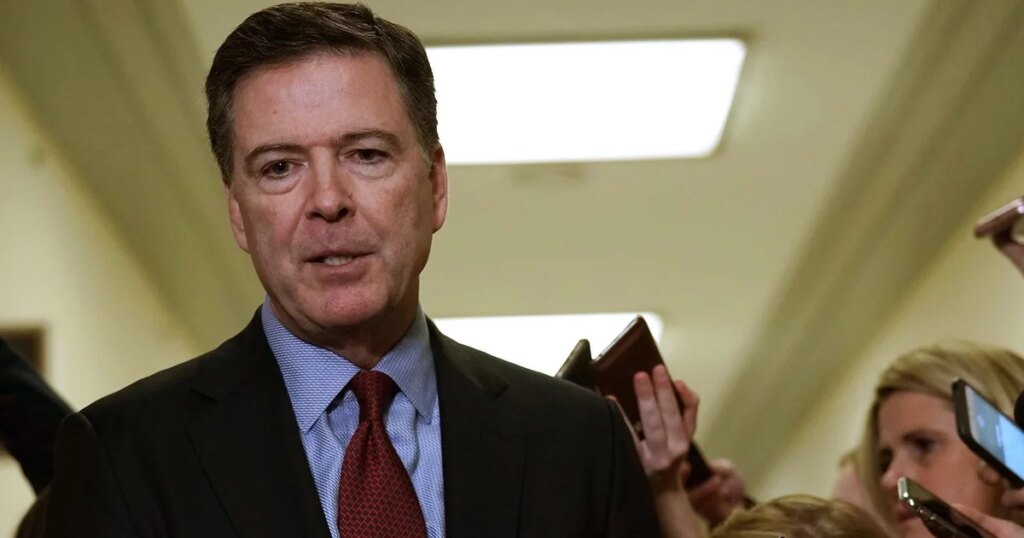Former FBI Director James Comey is facing serious legal challenges as his attorneys filed motions on Monday seeking to dismiss a federal indictment against him. They argue that the charges stem from “President Trump’s personal animus,” claiming that the prosecution is both vindictive and unlawful. A ruling on these motions is anticipated next month, setting the stage for an intense legal battle.
| Article Subheadings |
|---|
| 1) Legal Maneuvers to Dismiss Indictment |
| 2) Challenges to Interim U.S. Attorney’s Validity |
| 3) Prosecutors’ Concerns Over Defense Counsel |
| 4) Historical Context of Comey’s Indictment |
| 5) Implications for Future Prosecutions |
Legal Maneuvers to Dismiss Indictment
Attorneys for former FBI Director James Comey officially initiated a series of legal motions aimed at dismissing the two-count federal indictment against him. The charges, which include making false statements to Congress and obstruction of justice, were filed in September. Comey’s legal team argues that these charges result from a “vindictive and unlawful prosecution” orchestrated due to President Trump’s personal grievances against him. They contend that the indictment is a manifestation of “egregious abuse of power” and is fraught with “multiple glaring constitutional violations.” As their first step, his attorney, Patrick Fitzgerald, has called for an immediate dismissal of the case to prevent what they describe as a perpetual state of being subjected to unfair legal scrutiny.
Challenges to Interim U.S. Attorney’s Validity
Alongside the motions to dismiss the indictment, Comey’s legal representation has also targeted the validity of Lindsey Halligan’s appointment as the interim U.S. Attorney for the Eastern District of Virginia. They argue that Halligan, who was the only attorney involved in drafting the indictment, was defectively appointed. They claim that her selection violated statutory guidelines, asserting that no properly appointed official authorized the indictment against Comey. This line of argument is crucial, as Halligan’s involvement raises questions about the legitimacy of the prosecution itself.
Prosecutors’ Concerns Over Defense Counsel
In an unexpected twist, federal prosecutors indicated potential issues regarding Patrick Fitzgerald’s role as Comey’s defense counsel. The prosecution alleged that Fitzgerald may have been implicated in an alleged plan by Comey to leak the contents of sensitive memos to the media shortly after his firing by Trump in 2017. Prosecutors seek to have Fitzgerald disqualified from the case due to a claimed conflict of interest. They argue that this could lead to serious complications, especially if evidence protected by attorney-client privilege is involved. Consequently, prosecutors have asked for the establishment of a “filter team” to review the pertinent communication while maintaining the integrity of protected information.
Historical Context of Comey’s Indictment
The context surrounding Comey’s indictment has garnered significant media attention, particularly due to his fraught history with President Trump. After leading the FBI’s investigation into Russia’s interference in the 2016 election, Comey’s controversial firing in May 2017 marked the beginning of a fraught relationship between the former director and the president. Trump has repeatedly criticized Comey, blaming him for the scrutiny surrounding his campaign and presidency. Following a series of public outbursts, including a recent criticism aimed at Attorney General Pam Bondi for not prosecuting Comey sooner, the indictment appears to be a culmination of years of conflict.
Implications for Future Prosecutions
The legal proceedings against Comey also highlight broader implications for prosecutorial conduct within politically charged cases. Legal experts suggest that claims of vindictive prosecution, as well as the procedural objections raised by Comey’s legal team, might influence similar cases in the future. As Fitzgerald prepares to lodge additional motions challenging the prosecution, including allegations of grand jury abuse and other unacceptable conduct by the Justice Department, the outcome will likely set a precedent for how courts approach cases linked to political personalities. The emphasis on fair process may bolster defenses in cases where defendants argue they are merely being targeted for political reasons.
| No. | Key Points |
|---|---|
| 1 | Comey’s attorneys have filed motions aiming to dismiss the indictment against him. |
| 2 | The indictment is claimed to result from vindictive motives stemming from Trump’s personal animus. |
| 3 | Concerns arise over the appointment of interim U.S. Attorney Halligan, affecting the prosecution’s legitimacy. |
| 4 | Prosecutors are considering disqualification of Comey’s attorney Fitzgerald due to alleged conflicts of interest. |
| 5 | The case’s outcome could affect future prosecutions in politically sensitive circumstances. |
Summary
The legal battles surrounding James Comey have significant implications, not only for him but also for the fabric of justice in politically charged scenarios. As his legal team challenges the indictment on several fronts, including the credibility of the appointed authorities behind it, the attention this case garners can reshape public perceptions of prosecutorial motivations. Whether or not the indictment stands against Comey will affect how similar cases may unfold in the future, particularly those entwined with political figures and their adversaries.
Frequently Asked Questions
Question: What are the charges against James Comey?
James Comey has been charged with making false statements to Congress and obstruction of justice.
Question: Why do Comey’s lawyers argue the indictment should be dismissed?
Comey’s lawyers contend that the indictment results from vindictive prosecution based on personal grievances from President Trump, raising constitutional concerns.
Question: What are the implications of the ongoing legal proceedings for future cases?
The outcome of Comey’s case may set significant precedents regarding how courts handle politically sensitive prosecutions, particularly in cases where defendants claim they are being targeted for political reasons.
